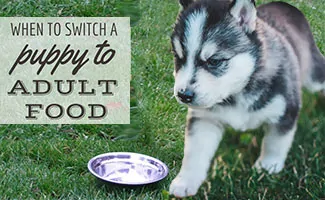Puppy Over 50 Pounds 12 Months Old How to Feed
To keep the lights on, we receive affiliate commissions via some of our links. Our review process.
 Switching a puppy to adult food isn't a "one-size-fits-all" approach. It can vary based on your dog's breed, age, and weight. We can help you determine when is the best time for you to switch your dog's food and how to transition them successfully.
Switching a puppy to adult food isn't a "one-size-fits-all" approach. It can vary based on your dog's breed, age, and weight. We can help you determine when is the best time for you to switch your dog's food and how to transition them successfully.
Article Overview
- How Long Should A Puppy Be On Puppy Food?
- Signs It's Time To Switch From Puppy To Adult Food
- Why Transition From Puppy To Adult Food
- How To Switch A Puppy To Adult Food
How Long Should A Puppy Be On Puppy Food?
In general, dogs are considered puppies if they are less than 1 year old. During this first year of life, they require a puppy-formulated diet to ensure they are getting the proper nutrients for growth. However, the time your dog is on puppy food can vary based on your dog's breed size.
Puppyhood Is The Best Time To Consider Pet Insurance
 As a puppy, your dog has probably not shown any significant health concerns at a young age. Since pet insurance companies do not cover pre-existing conditions, the younger your dog is when you signup, the better coverage you will likely receive throughout their lifetime.
As a puppy, your dog has probably not shown any significant health concerns at a young age. Since pet insurance companies do not cover pre-existing conditions, the younger your dog is when you signup, the better coverage you will likely receive throughout their lifetime.
Further, pet insurance can help support you financially during the unpredictable puppy years when dogs are more likely to chew on things they shouldn't and run into dangerous situations. Check out our pet insurance 101 guide to learn more and determine whether pet insurance is worth it for your puppy.
Signs It's Time To Switch From Puppy To Adult Food
Once your dog reaches a certain weight or age, you'll need to transition to adult dog food. Please note that these are rough estimates for weight and ages, and you should consult your vet to determine what's best for your dog.
- Toy breeds (4 to 7 pounds at maturity): around 9 months old
- Small breeds (8 to 20 lbs at maturity): around 12 months old
- Medium breeds (21 to 50 lbs at maturity): around 12 months old
- Large breeds (51 to 85 lbs at maturity): 18 to 24 months old
- Giant breeds (more than 85 lbs at maturity): 18 to 24 months old
It's best to ask your vet about your dog's diet. And if you're unsure about your dog's breed, consider doing a canine DNA test.
Why Transition From Puppy To Adult Food
Puppies require different nutrients and calories than adult dogs. Puppy-formulated foods typically have higher protein and fat to help them grow. They also often include DHA, which is also in mother's milk.
Once your puppy is fully grown, they don't need as many calories. If you continue to feed puppy food to an adult dog, it could result in the dog gaining excess weight.
How To Switch A Puppy To Adult Food
When it is time to switch to adult food, make sure you do it slowly. You'll want to transition over multiple days and watch for any upset stomach issues. To learn the correct way to adjust a dog's diet, read our full article on how to change your dog's food safely.
If you need ideas on which food is healthiest for your dog and most convenient for you, check out dog food delivery options, including fresh recipes from A Pup Above. Fresh pet food companies make it easy to customize your dog's diet based on age, weight, energy level, and diet, while at-home delivery ensures you always have the next meal on hand.
Tagged With: Aging
The information provided through this website should not be used to diagnose or treat a health problem or disease; it is not intended to offer any legal opinion or advice or a substitute for professional safety advice or professional care. Please consult your health care provider, attorney, or product manual for professional advice. Products and services reviewed are provided by third parties; we are not responsible in any way for them, nor do we guarantee their functionality, utility, safety, or reliability. Our content is for educational purposes only.
Source: https://www.caninejournal.com/when-to-switch-puppy-to-adult-food/
0 Response to "Puppy Over 50 Pounds 12 Months Old How to Feed"
Post a Comment